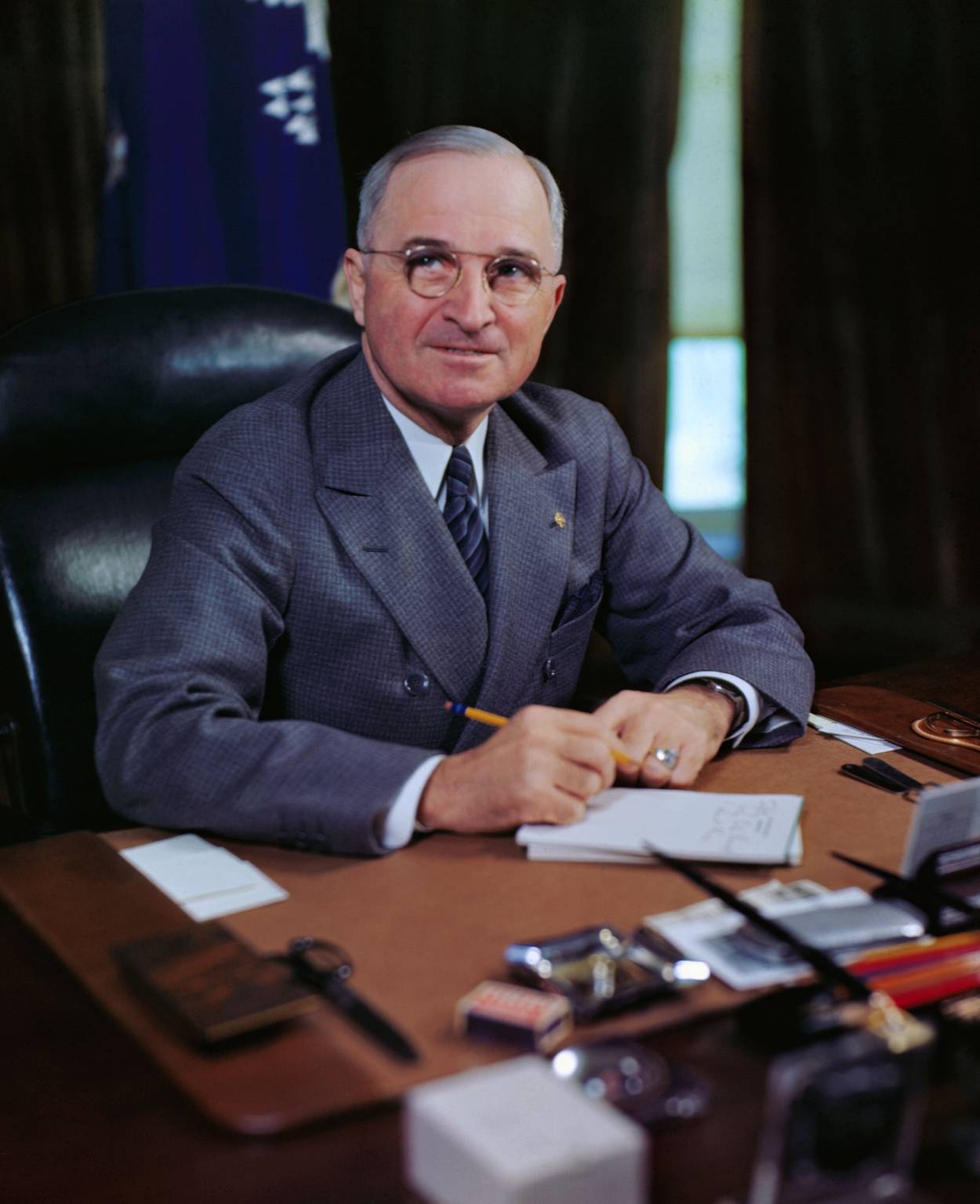Harry Truman’s Seder Message
His 1945 address to American troops drew a lasting connection between the Passover story and the nation’s consciousness

Getty Images

Getty Images

Getty Images

Getty Images
With Hamas still holding Israeli hostages and global antisemitism rampant, as Jewish families sit down to read the Passover Haggadah this year on Monday evening, April 22, the passage “in every generation, there are those who rise up to destroy us” will no doubt be particularly resonant. While most Jews are aware that the phrase—like the phenomenon of Jew-hatred it describes—is centuries old, few fully appreciate the role the Passover story has played in offering Americans of all backgrounds comfort and inspiration during difficult times. The Haggadah, in fact, has long been America’s guidebook for liberty.
At 5 p.m. on March 26, 1945, in Washington, D.C., Vice President Harry S. Truman addressed the annual Passover service at the Jewish Welfare Board during WWII. The speech, broadcast to the Jewish men and women in the Armed Forces, praised both the miracle of Jewish historical survival and the contributions of Judaism to the West. It encapsulates how the story of the Exodus has left an indelible imprint on the American consciousness.
“Since biblical times,” Truman began, “people of the Jewish faith have made great contributions to the moral code of mankind.” He then described how, for centuries, the Jewish faith has served as an ethical beacon for humanity. “From the revelation of the Ten Commandments by Moses to the philosophical teachings of modern Jewish scholars,” he continued, “there has been a constant search for a better way of life for the benefit of all.” Fighting against the worship of “pagan idols,” the Jews “preached eternal faith in one God—the God in whom we all put our trust.”
The vice president then took the occasion, the beginning of the Festival of Freedom, to express gratitude, on behalf of America, for the gifts bestowed by the God of Israel. “All God-fearing people,” he said, “can well join with those of the Jewish faith to thank the Almighty for the many blessings received.” Millions of people, across Europe, Asia, and Africa, had already been “liberated by the forces of freedom.” Though the conflict was ongoing, great progress had been made toward victory over the Nazis.
Chapter 11 of the Book of Exodus describes how, during the Plague of the Firstborn, Jewish homes were protected while the tyrannical Egyptians were struck down. Harking to this episode, Truman observed that “[t]oday the Angel of Death is again passing over the house of the modern tyrants,” slaying the forces of evil while sparing the “moral principles, for which the United Nations fight.”
Alluding to the horrors of the Holocaust and millennia of prior persecution, Truman expressed admiration for not only Jewish resilience but for the support Jews have given to others experiencing discrimination:
Having suffered persecution for centuries, the Jewish people steadfastly adhered to their ancient faith—the faith which gave them courage and fortitude to withstand man’s inhumanity to man. Furthermore, the Jews were frequently in the vanguard of the fight to aid other oppressed minorities.
Truman then turned to Hitler and his hateful dehumanization of the Jews. Hitler, Truman said, sought their destruction as a means to “pave the way for his plans for world domination.” Yet, he added, Hitler did not “reckon with the courage and endurance of a race hardened by centuries of oppression, and strengthened by a firm faith that ultimately another Moses must come to lead them out of their modern bondage and into the Promised Land.”
Identifying the American worldview with the desert aspirations of the liberated ancient Hebrews, Truman expressed the collective seeking of a “Promised Land, where intolerance and bigotry do not exist.” In such an era, there would be “peace and security, where all good people can dwell together in harmony as brothers.” This, Truman argued, could only be achieved by proper planning to counter ignorance and the intolerant.
Perhaps alluding to the Passover Seder’s emphasis on education from generation to generation, Truman emphasized that the “general education” that would be needed in a post-Hitler world would be a “long and endless process.” The journey, like that arduous march out of Egypt, would require those of good will to “work together for the promotion of racial and religious harmony among all people, so that we may ultimately achieve the Promised Land on this earth which our Creator surely expects.”
Truman then concluded with another call for all Americans to appreciate their blessings on this day, and to pray for lasting peace.
According to the Truman Library Institute, among those who heard the speech were two Jewish American soldiers stationed in Dahn, Germany. Chaplain (Maj.) Eli Bohnen was a rabbi serving with the U.S. Army’s 42nd Infantry Division. Cpl. Eli Heimberg was his assistant. That night, they would lead their division in the recitation of the Passover service using a Haggadah the two had designed especially for the occasion. Their prayer book is believed to be the first printing of a Jewish liturgical text in Germany since the Nazis rose to power in 1933.
The Passover story, described by Vice President Truman and recited that evening by Bohnen and Heimberg’s troops, continues to serve as the prism through which Americans may envision fulfillment of their nation’s promise. Its tale of miraculous liberation and the divinely inspired aspiration for the moral betterment of mankind serves, ever still, as a source of faith for those seeking freedom for the benefit of all.
Rabbi Dr. Stuart Halpern is Senior Adviser to the Provost of Yeshiva University and Deputy Director of Y.U.’s Straus Center for Torah and Western Thought. His books include The Promise of Liberty: A Passover Haggada, which examines the Exodus story’s impact on the United States, Esther in America, Gleanings: Reflections on Ruth and Proclaim Liberty Throughout the Land: The Hebrew Bible in the United States.